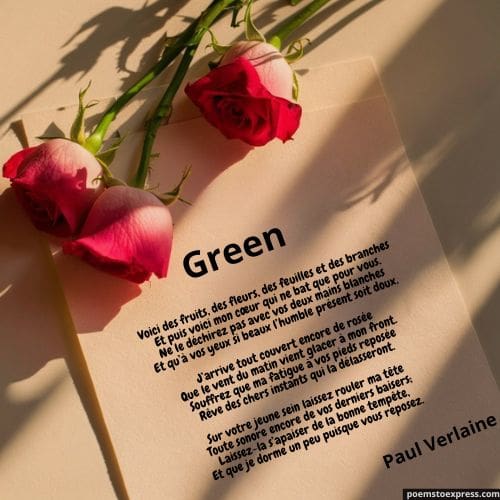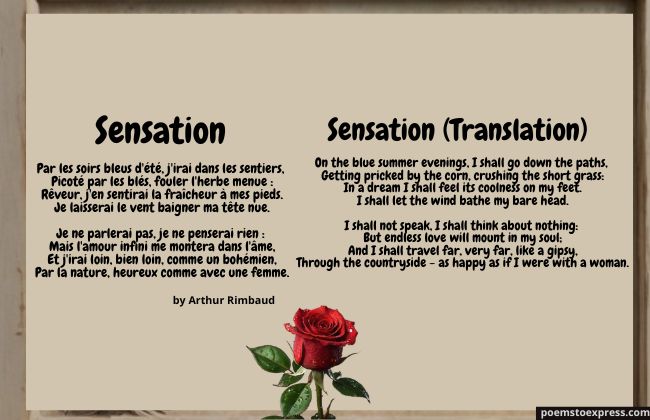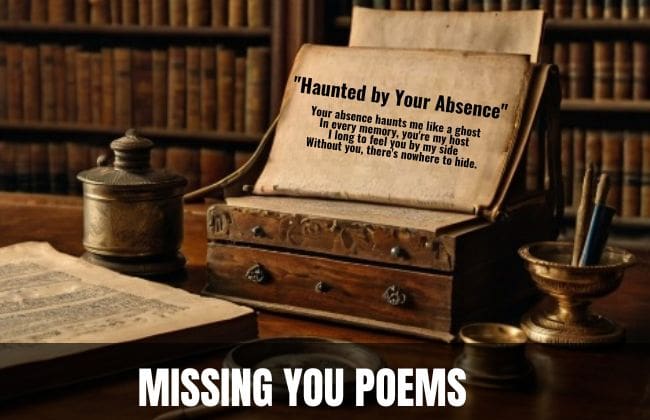French poetry has always been a charming refuge for lovestruck hearts and romantic souls.

From whispers of love in medieval gardens to the passionate verses of the 19th century, France has brought to life some of the most beautiful declarations of love through poetry.
Renowned poets like Paul Verlaine, Arthur Rimbaud, and Jacques Prévert have created verses that resonate with the timeless themes of desire, longing, and heartbreak.
Their works not only reflect the cultural nuances of their time but also speak to universal experiences, making them enduring favorites among poetry lovers.
In this article, we will delve into some of the most famous French love poems, exploring their themes, styles, and the emotions they evoke.
Join us on this journey through the lyrical landscape of love in French poetry.
Table of Contents
- 1 1) ‘Green’ by Paul Verlaine
- 2 2) Nous dormirons ensemble by Louis Aragon
- 3 3) “La Courbe de tes Yeux” by Paul Éluard
- 4 4) “A une Passante” by Charles Baudelaire
- 5 5) “Sonnet 5” by Louise Labé
- 6 6) “Mignonne, allons voir si la rose” by Pierre de Ronsard
- 7 7) “Ode à Cassandre” by Pierre de Ronsard
- 8 8) “Sensation” by Arthur Rimbaud
- 9 9) Le pont Mirabeau by Guillaume Apollinaire
- 10 10) Les Pas by Paul Valéry
- 11 Themes and Styles in French Love Poetry
1) ‘Green’ by Paul Verlaine
The poem “Green” by Paul Verlaine, part of his collection Romances sans paroles, reflects the delicacy and intimacy of love through the offering of natural gifts such as flowers, fruits, and leaves to the beloved.
Verlaine uses rich imagery to evoke tenderness and vulnerability, asking his beloved to accept these gifts and, metaphorically, his heart.
The poem is notable for its gentleness and cautious entreaties, where the speaker expresses a deep desire to be accepted and loved, reflecting a mix of desire and fear of the beloved’s reaction.
This focus on emotion and sensory expression is typical of French Symbolist poetry, which aims to evoke rather than directly describe.
Voici des fruits, des fleurs, des feuilles et des branches
Et puis voici mon cœur qui ne bat que pour vous.
Ne le déchirez pas avec vos deux mains blanches
Et qu’à vos yeux si beaux l’humble présent soit doux… See full poem
Green (English Translation)
Here are flowers, branches, fruit, and fronds,
And here too is my heart that beats just for you.
Do not tear it with your two white hands
And may the humble gift please your lovely eyes.
I come all covered still with the dew
Frozen to my brow by the morning breeze.
Let my fatigue, finding rest at your feet,
Dream of dear moments that will soothe it.
On your young breast let me cradle my head
Still ringing with your recent kisses;
After love’s sweet tumult grant it peace,
And let me sleep a while, since you rest.

2) Nous dormirons ensemble by Louis Aragon
The title and refrain “Nous dormirons ensemble” (We Will Sleep Together) suggest a promise of eternal and constant intimacy, reiterated throughout the poem, symbolizing both a physical act and a spiritual union.
Aragon uses repetition to emphasize the inevitability and perpetuity of this encounter, showing how love and desire transcend temporal confines and become a continuous cycle of reunion.
The image of the sky as a “drap” (sheet) over them adds a dimension of comfort and protection, evoking a sense of peace and fulfillment in the presence of the loved one.
This poem aligns with the tradition of French love poems, which often explore the intensity of love and the connection between lovers. It is a work notable for its ability to capture the universality and timelessness of love.
Que ce soit dimanche ou lundi
Soir ou matin minuit midi
Dans l'enfer ou le paradis
Les amours aux amours ressemblent
C'était hier que je t'ai dit
Nous dormirons ensemble… See full poem
We shall sleep together (English Translation)
Whether it be Sunday Monday
Evening ,morning, midnight, midday
Whether it be in hell, in paradise,
Love-affairs look like each other.
I said to you just Yesterday:
We shall sleep together .
'twas Yesterday, it's tomorrow
You are the only path I know.
Between your hands, I've put my Heart,
With yours, look how it goes ambling!
For its human Time remaining,
We shall sleep together.
My love, what was, has been, shall be.
The Sky's spread on us like a sheet,
Around you, I have clasped my arms.
I love you so that I tremble.
And as long as you want,
We shall sleep together.
3) “La Courbe de tes Yeux” by Paul Éluard
Paul Éluard’s poem “La Courbe de tes Yeux” is a quintessential example of French love poetry that embodies the surrealism movement.
His poem translates the ineffable nature of love into the language of dreams and visions.
In the piece, Éluard likens the curve of his lover’s eyes to a protective circle around his heart. This imagery suggests a dance of intimacy and tenderness, a theme often prevalent in his work.
Éluard’s use of natural elements – leaves, dew, reeds, and the wind – creates a universe where love is a force interwoven with the very fabric of the world. The words of the poem have been crafted to evoke emotions and imagery as soft and encompassing as the eyes he speaks of.
La courbe de tes yeux
La courbe de tes yeux fait le tour de mon coeur,
Un rond de danse et de douceur,
Auréole du temps, berceau nocturne et sûr,
Et si je ne sais plus tout ce que j’ai vécu
C’est que tes yeux ne m’ont pas toujours vu… See full poem
English Translation
The curve of your eyes goes around my heart,
A round of dance and sweetness,
Halo of time, nocturnal and safe cradle,
And if I no longer know all that I have lived
It's that your eyes have not always seen me…
4) “A une Passante” by Charles Baudelaire
The poem captures a fleeting moment between the speaker and a mourning woman who passes by him on a bustling city street. The interaction is brief but leaves a profound impact on the speaker.
Through vivid imagery and rich emotion, Baudelaire conveys the theme of unattainable love and the isolation felt within a crowd. The woman’s grace and the speaker’s silent admiration create a poignant scene that speaks to the universal experience of a momentary, unspoken connection with a stranger.
Baudelaire’s mastery of language and symbolism has made “A une Passante” a seminal work in French literature, evoking the complexities of urban life and ephemeral beauty.
À une passante
La rue assourdissante autour de moi hurlait.
Longue, mince, en grand deuil, douleur majestueuse,
Une femme passa, d'une main fastueuse
Soulevant, balançant le feston et l'ourlet;… See full poem
To a Passer-By (English Translation)
The street about me roared with a deafening sound.
Tall, slender, in heavy mourning, majestic grief,
A woman passed, with a glittering hand
Raising, swinging the hem and flounces of her skirt;…

5) “Sonnet 5” by Louise Labé
Composed during the 16th century, her poetry often explores themes of love and desire with an intense emotional depth that was notable for women’s writing at the time.
This sonnet, like others in her oeuvre, is structured according to the formal conventions of the Petrarchan sonnet with its octave and sestet. The poem delves into the anguish and longing characteristic of unrequited love.
Labé employs direct and evocative language, enabling readers to resonate with the universal aspects of love’s pains and pleasures. Through “Sonnet 5,” Labé offers a timeless reflection on love’s complexities that continues to captivate modern audiences.
V
Clere Venus, qui erres par les Cieus,
Entens ma voix qui en pleins chantera,
Tant que ta face au haut du Ciel luira,
Son long travail et souci ennuieus… See full poem
(English Translation)
Listen, bright Venus-errant in the air!
Do you hear this clear voice moving, as I sing
to your face, shining so high above everything,
about my long labor and my exhausting care?... See full
6) “Mignonne, allons voir si la rose” by Pierre de Ronsard
Addressing his muse, Cassandre, he draws parallels between the fleeting life of a rose and human youth.
The poem opens with an invitation to observe a rose that has bloomed that very morning and, by evening, has already begun to lose its petals.
Through this metaphor, Ronsard reflects on the rapidity with which beauty fades and the urgency to cherish it before it’s lost. The work is an exemplar of the carpe diem theme, a common literary motif that encourages readers to seize the day.
Mignonne, allons voir si la rose
Qui ce matin avoit desclose
Sa robe de pourpre au Soleil,
A point perdu ceste vesprée
Les plis de sa robe pourprée,
Et son teint au vostre pareil… See full poem
(English Translation)
Sweetheart, let's see if the rose
That this morning had unfolded
Its crimson dress to the Sun,
Has not lost, at evening,
The folds of its crimson dress,
And its complexion similar to yours…

7) “Ode à Cassandre” by Pierre de Ronsard
The poem is a quintessential example of the carpe diem theme—an encouragement to seize the day.
Ronsard addresses his verses to Cassandre, using the metaphor of the rose which has bloomed in the morning but will fade by evening. His counsel is to enjoy the beauty and pleasures of life before they slip away.
The poem opens with the famous line “Mignonne, allons voir si la rose,” which invites the reader into a vivid depiction of youth and beauty’s transient nature.
The rose, having unfurled its crimson garments to the sun’s touch, becomes an emblem of ephemeral grace. Ronsard’s eloquent language underscores the urgency of loving while one is still young.
Mignonne, allons voir si la rose
Qui ce matin avait déclose
Sa robe de pourpre au soleil,
A point perdu cette vesprée
Les plis de sa robe pourprée,
Et son teint au vôtre pareil… See full poem
(English Translation)
Sweetheart, let’s see if the rose
That this morning had open
Her crimson dress to the Sun,
This evening hasn’t lost
The folds of her crimson dress,
And her complexion similar to yours…
8) “Sensation” by Arthur Rimbaud
“Sensation,” a poem by the French literary figure Arthur Rimbaud, is celebrated for its evocation of love intermingled with the allure of nature.
Composed in March 1870, when Rimbaud was just sixteen, the poem reflects the liberty and sensory exploration emblematic of his work.
Grounded in first-person perspective, “Sensation” draws a parallel between the natural landscape and the emotional landscape of intimacy, without explicitly mentioning love.
The poem presents a picture of the poet wandering through the countryside on a blue summer evening, conveying the ecstasy of freedom and unity with the natural world.
Rimbaud utilizes simple language to depict profound emotional states, leading the reader through a journey of sensory experiences that culminate in a tranquil yet profound emotional awakening.
Sensation
Par les soirs bleus d'été, j'irai dans les sentiers,
Picoté par les blés, fouler l'herbe menue :
Rêveur, j'en sentirai la fraîcheur à mes pieds.
Je laisserai le vent baigner ma tête nue.
Je ne parlerai pas, je ne penserai rien :
Mais l'amour infini me montera dans l'âme,
Et j'irai loin, bien loin, comme un bohémien,
Par la nature, heureux comme avec une femme.
Sensation (English Translation)
On the blue summer evenings, I shall go down the paths,
Getting pricked by the corn, crushing the short grass:
In a dream I shall feel its coolness on my feet.
I shall let the wind bathe my bare head.
I shall not speak, I shall think about nothing:
But endless love will mount in my soul;
And I shall travel far, very far, like a gipsy,
Through the countryside - as happy as if I were with a woman.

9) Le pont Mirabeau by Guillaume Apollinaire
“Le Pont Mirabeau” by Guillaume Apollinaire uses the image of the River Seine flowing under the Mirabeau Bridge as a metaphor for love that slips away and the ceaseless passage of time.
Apollinaire reflects on loss and impermanence, blending feelings of melancholy with the beauty of enduring memories.
Through lyrical language and a repetitive structure, the poem underscores the inevitability of both love and time fading, leaving only art as a testimony to what was experienced.
This work is part of the tradition of French poetry, renewing it with a modernist approach that plays with form and content to explore deep themes of human experience.
Sous le pont Mirabeau coule la Seine
Et nos amours
Faut-il qu’il m’en souvienne
La joie venait toujours après la peine… See full poem
(English Translation)
Under the Mirabeau Bridge runs the Seine
And our love
I must bring to mind once again
That joy always came after pain
10) Les Pas by Paul Valéry
In “Les Pas” by Paul Valéry, the poem explores the anticipation of the lyrical self for the arrival of a beloved presence, personified through her steps described as “children of my silence.”
These steps approach in a solemn and meditative manner toward the “bed of my vigilance,” evoking an atmosphere filled with expectation and reverence.
The poem reflects a mix of serenity and emotional depth, where each step seems to bring divine gifts closer to the speaker, in an almost sacred and pure environment.
The work uses language that intensifies the spiritual and almost mystical connection between the poet and the beloved figure.
Tes pas, enfants de mon silence,
Saintement, lentement placés,
Vers le lit de ma vigilance
Procèdent muets et glacés.
Personne pure, ombre divine,
Qu’ils sont doux, tes pas retenus !
Dieux !… tous les dons que je devine
Viennent à moi sur ces pieds nus !.. See full poem
“Les Pas” (English Translation)
Your footsteps, children of my silence,
Saintly, slowly placed
Towards the bed of my watchfulness,
Approach, muted and frozen.
Pure one, divine shadow,
How gentle, your cautious steps are!
Gods! …all the gifts that I can guess
Come to me on those naked feet!
If, with your lips advancing,
You are preparing to appease
The inhabitant of my thoughts
With the sustenance of a kiss,
Do not hurry this tender act,
Bliss of being and not being,
For I have lived for waiting for you,
And my heart was only your footsteps
Themes and Styles in French Love Poetry
1. Romanticism
Romanticism was a major artistic, literary, and intellectual movement that originated in Europe towards the end of the 18th century.
In French love poetry, Romanticism is characterized by an emphasis on emotion, nature, and individualism.
Poets like Victor Hugo and Alphonse de Lamartine explored themes of passionate love, melancholy, and the sublime beauty of nature.
Their works often reflect a deep longing and a sense of idealism.
Characteristics:
- Emotional intensity
- Celebration of nature
- Focus on individual experience
- Idealization of love and beauty
2. Symbolism
Symbolism emerged in the late 19th century as a reaction against the realism and naturalism of the time.
Symbolist poets like Paul Verlaine and Stéphane Mallarmé used metaphor, allegory, and symbolic imagery to convey complex emotions and ideas.
In the context of love poetry, Symbolism often delves into the mystical and the abstract, exploring love as an enigmatic and transcendent force.
Characteristics:
- Use of symbolic imagery and metaphors
- Exploration of the mystical and the abstract
- Emphasis on musicality and rhythm in verse
- Ambiguity and open-ended meanings
3. Modernism
Modernism in French love poetry reflects the broader literary and artistic movement of the early 20th century, which sought to break away from traditional forms and conventions.
Poets like Guillaume Apollinaire and Paul Éluard experimented with free verse, unconventional structures, and surreal imagery.
Their love poems often capture the complexities and contradictions of modern life, blending romantic longing with a sense of disillusionment.
Characteristics:
- Experimentation with form and structure
- Use of free verse and non-traditional rhyme schemes
- Surreal and fragmented imagery
- Exploration of modern life’s complexities and contradictions
4. Common Themes
While French love poetry spans various movements and styles, certain themes recur across different periods:
- Passionate Love: Intense and often unrequited love is a central theme, exploring the highs and lows of romantic relationships.
- Nature: Nature often serves as a backdrop or metaphor for love, symbolizing beauty, growth, and sometimes, the fleeting nature of life and love.
- Melancholy: Many French love poems express a sense of longing, sadness, and the pain of separation or unfulfilled desire.
- Idealization: Love is frequently idealized, portrayed as a perfect, almost unattainable state that transcends ordinary experience.
- Transcendence: Love is seen as a force that elevates the human spirit, offering a glimpse of something greater and more profound.
You might also like:






